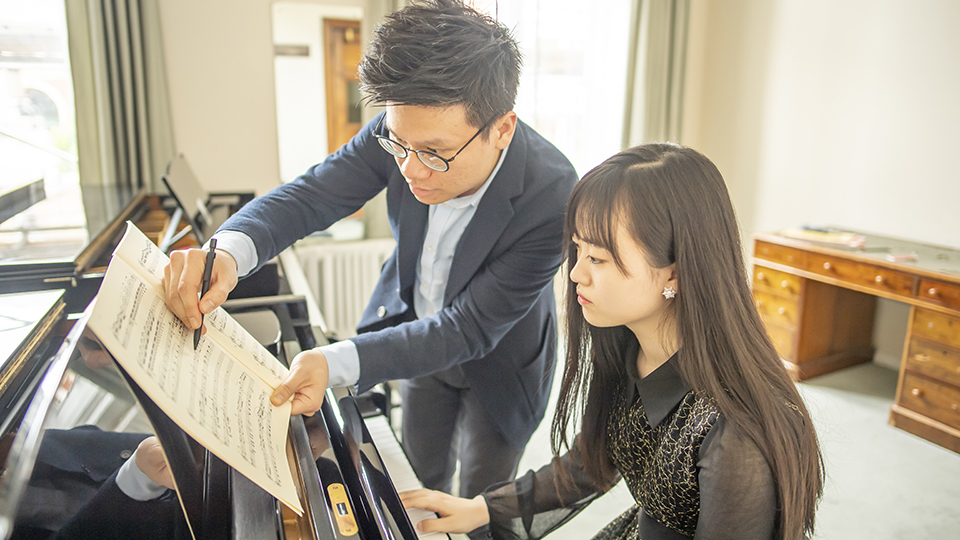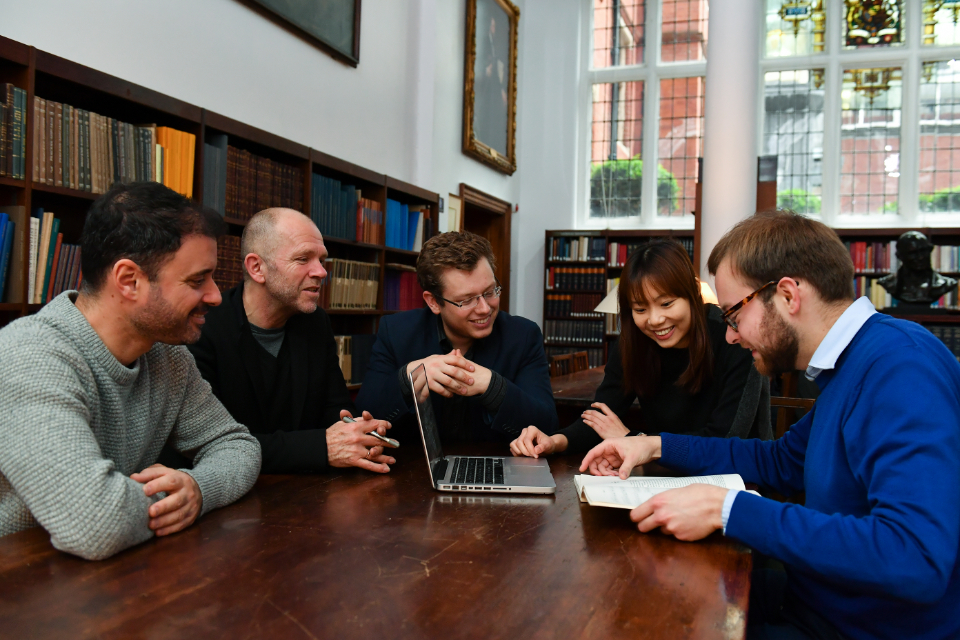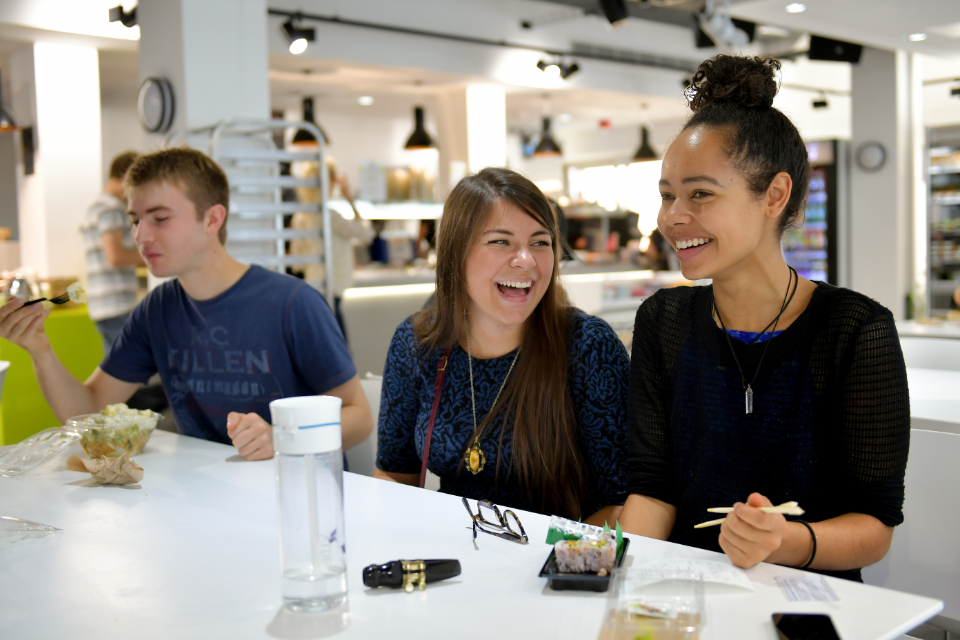MMusEd Teaching Musician
UCAS code
720F (intensive 725F)
Start date
September 2024
Duration
2 years full-time or 12 months intensive
Learning & Teaching Opportunities Entry requirements How to apply Enquiries
We are currently accepting applications for September 2024 entry to the MMusEd programme. Please contact our friendly Admissions team to discuss your application further.
Throughout the programme, students will receive rigorous training in Principal Study performance or composition, enabling them to continue developing their musical skills to the highest international level. At the same time, they will receive vocational training in the essential skills required for a range of music education settings, including teaching and learning skills, curriculum/project design, instrumental pedagogy and creative musicianship.
The programme is structured to provide students with a comprehensive understanding of contemporary music education practices and techniques, enabling them to develop their creative potential and acquire a diverse range of teaching skills. Central to their studies, students will participate in a range of music education placements benefitting from the RCM's unique partnerships with schools, music services and hubs and the education departments of various music organisations.
The programme is delivered by an expert team of music educators, composers and performers, who bring a wealth of industry experience and knowledge to the course. Through a combination of lectures, workshops, seminars and practical sessions, students will engage with a diverse range of music education approaches and techniques.
Graduates of the Teaching Musician programme will be well-equipped to pursue a range of career paths in the music education sector, including:
- instrumental / vocal / composition teaching, both privately and in some school settings
- working within music services or hubs
- participatory music programmes
- the education departments of a range of musical organisations.
They will also have the skills and knowledge required to pursue further study at doctoral level.
Overall, the RCM MMusEd Teaching Musician programme offers a unique opportunity for students to develop their professional performance or composition skills, while gaining the essential vocational training required for a successful career in music education.
The MMusEd course is offered full-time or Intensive and is delivered over two-years or twelve months respectively. The course is available to students requiring a visa to study in the UK.
The course is open to instrumentalists, singers and composers. Please note it is not available for the following principal studies: conducting, contemporary piano, collaborative piano, composition for screen.
Please note that this programme is not an initial teacher training (ITT) programme and therefore does not carry UK Qualified Teacher Status.
Learning & teaching
Through a combination of one-to-one lessons, lectures, practical workshops, specialist faculty seminars, and online learning MMusEd students develop deep understanding of teaching techniques in a range of music education settings, informed by cutting-edge research in international music education and performance science.
All MMusEd students receive one-to-one instrumental, vocal, or composition lessons with an RCM professor that are tailored to their needs as an aspiring teaching musician. There is also the flexibility to receive lessons on a second study or related instrument/s. For a full list of one-to-one teaching staff in your area of study please refer to individual faculties.
Central to the programme is a practice-led, professional approach to developing as a teaching musician. All MMusEd students undertake placements with the RCM’s leading music education partners which enables learning through practice in a range of innovative and progressive music education settings.

Royal College of Music courses are internationally recognised as full degree courses with successful students awarded their qualifications under the RCM's Royal Charter.
Opportunities
From the very beginning of the course you will be able to draw on exceptional resources and opportunities, such as the RCM Library, the RCM Museum, the Centre for Performance Science, Creative Careers Centre and RCM Sparks – our outreach and education programme.
The Royal College of Music is proud to offer its students fantastic practice and performance facilities with resources to support teaching and learning. We continually improve our facilities to ensure RCM students have the best opportunities.
Explore our facilities with a video tour of the RCM
Key facilities at the RCM include:
- The Amaryllis Fleming Concert Hall — our primary performance venue for orchestras and large ensembles
- Our 400-seat Britten Theatre, home to the RCM’s thriving Opera Studio
- A new Performance Hall, offering an alternative space for ensembles, with a retractable stage, Fazioli grand piano and variable acoustics
- Intimate spaces for solo and chamber performance in our Performance Studio and Parry Rooms
- Sound-proofed Amadeus Music Pods for private practice
- A purpose-built percussion suite – you can watch a video tour on YouTube
- Over 160 pianos, including 60 grand pianos and 20 early keyboards, as well as organ rooms
- A Blüthner Practice Suite which holds ten Blüthner Model A upright pianos
- Instrument surgeries including luthier services
- RCM Studios: a commercial-grade facility, enabling live broadcasts around the world
- The Digital Innovation Lab: a state-of-the-art recording and mixing suite
- The RCM Library has more than 200,000 scores, books and recordings in its lending collection, as well as access to more than 400 music journals
- The RCM Museum holds more than 14,000 instruments, portraits and images, as well as a climate-controlled performance space and dedicated research facility
The RCM’s Creative Careers Centre, which is recognised internationally for its innovative approach to supporting young musicians, provides an unparalleled service to current students and recent alumni. The dedicated team partners with leading consultants, reputable arts organisations and local communities, delivering unique career-building opportunities and a direct route to the music industry.
The work of the Creative Careers Centre allows students to discover their professional identity, gain hands-on experience and new skills, develop an entrepreneurial mindset and build a fulfilling professional portfolio.
Extensive performance and teaching opportunities are available, as well as valuable guidance on CV and biography writing, concert programming, communication skills, project management, marketing and publicity, online promotion, financial matters and how to develop a business idea.
RCM courses are reviewed annually in response to student and external examiner feedback, which sometimes results in minor changes, such as the availability of particular modules. A more thorough review is undertaken every five to six years, after which more substantial changes may be made while maintaining the ethos that underpins the course. Our review process is part of the RCM’s continued commitment to provide the best possible education and music training. The information provided here reflects the official course outline as it currently stands. In the event of alterations following a review, we will update this page as soon as possible.
Entry requirements
Suitability for this course is assessed by interview and practical audition.
In addition, applicants require:
- An undergraduate degree or equivalent international qualification, usually in music.
Applicants for the intensive course must be able to demonstrate at audition/interview that their existing performance and academic skills will enable them to manage the demands of the course.
You do not have to provide evidence of your qualifications at the point of application. If your audition is successful, you will be asked to send these to our Admissions team as a condition of your offer.
The RCM welcomes applicants from all backgrounds and alternative qualifications may be considered. If your qualifications are not listed here, please contact our Admissions team, who will be happy to discuss your suitability for the programme.
All applicants must pass an Enhanced DBS (Disclosure and Barring Service) check before commencing the course. A DBS check is a compulsory requirement for courses where trainees may be placed in a position of trust working with children and/or vulnerable adults. Further details of how to apply for a DBS check will be sent to offer holders once they have accepted their place. If you are concerned that a prior conviction may prevent you from successfully passing a DBS check, you are welcome to contact the Course Leader to discuss your circumstances in confidence.
English language requirements
All applicants must be able to demonstrate that their level of English language ability meets the Royal College of Music’s minimum requirements in order for their application to be accepted.
If you require a visa to study at the RCM, you must meet the English language requirements before the RCM is permitted to sponsor your visa application.
How to apply
The main application deadline has now closed however we continue to welcome applications for September 2024 entry to the MMusEd programme. Please contact our friendly Admissions team to discuss your application further.
All applicants (including international applicants) should apply online through the UCAS Conservatoires admissions service, where you can apply simultaneously to all the institutions that are members of Conservatoires UK. You can track your application, find out when your audition is and get the results of your audition all on UCAS Conservatoires. You can also confirm your decisions online.
Guidance on completing your application form is available on the UCAS Conservatoires website. As part of your application, you will require two references: one practical (normally from your current principal study teacher) and one academic (normally from someone at your current/previous educational institution who can comment on your academic ability). You must enter your referees’ details into the application, and an automated e-mail will be sent to them requesting a reference. Only once your referees have responded will your application be forwarded to the RCM, so it is important to begin your application in good time. Further guidance is available from UCAS Conservatoires if you think your referees may not be able to provide a reference in time.
If you are a current RCM student applying for a postgraduate performance or composition course, we only require a practical reference as we can verify your academic record. To enable you to submit your application, for the academic reference, tick the option to submit an offline reference. You will still need to enter details of a referee, but ticking the box will enable you to submit your application without UCAS sending them a reference request. However, note that if you are also applying to other conservatoires, you are likely to need an academic reference too.
All application fees are paid online through UCAS conservatoires.
Visit UCAS Conservatoires.
UCAS Conservatoires application fees - 2024 entry
Using UCAS Conservatoires incurs a £27.50 application fee. This is in addition to our assessment fees. You cannot use another system and both the application and assessment fees are paid online through UCAS Conservatoires. If you encounter any problems with their payment system please contact their support team.
RCM Audition fee waivers (59 kb)
If you change your mind about applying, you can contact UCAS Conservatoires to cancel and request a refund. To be entitled to a refund you must cancel within 14 days of the date you submitted your application. You can find further details about how to do this, and information about amending your application details, on the UCAS Conservatoires website.
Auditions
Stage 1- Interview
All applicants will be invited for an online interview. The interview gives you an opportunity to explain your interest and motivation for undertaking the course and to discuss any areas of interest in the field you may have. The interview also gives you the opportunity to find out more about the programme and studying at the RCM in general.
Stage 2 – Audition
Shortlisted applicants will be invited for an audition on their principal study. The main audition period is late November to mid December. Recorded auditions are assessed during the same period.
Composers
Composers audition by submitting a portfolio of work to the RCM for consideration. Those applicants whose portfolios demonstrate potential will also be invited to an interview with the Composition Faculty. Interviews are available in London or online. Please select your preferred assessment location in your UCAS Conservatoires application.
Composition audition requirements
Performers
Auditions for this course take place in London. International applicants who cannot travel to the UK may submit a video audition instead. Please select your preferred assessment method in your UCAS application.
Audition requirements are set by each faculty. Further information can be found by following the links below.
Historical Performance audition requirements
Keyboard audition requirements










